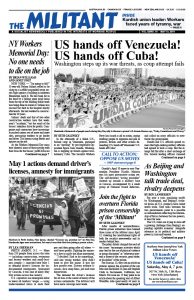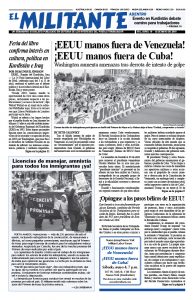For over a year, punishing tariffs by Washington, and Beijing’s tit-for-tat levies on U.S. products have roiled world trade. Now talks between the two governments point to a possible accommodation reflecting the relationship of forces between the two powers, at least for now.
The U.S. rulers are trying to stave off a growing challenge from Beijing’s expanding capitalist economy alongside advances in its political and military power in Asia and beyond.
The Chinese rulers hosted their second Belt and Road forum in Beijing April 26-27, attended by over 5,000 delegates and leaders of 37 countries from across the globe. Beijing’s goal was to defend its massive infrastructure plans for Eurasia from criticism.
At the same time, the Chinese rulers indirectly flagged to their U.S. counterparts a willingness — rhetorically at least — to address Washington’s interests in their trade dispute. President Xi Jinping projected increasing Chinese imports, protecting intellectual property rights, keeping the Chinese currency stable and allowing more foreign investment alongside Chinese capital.
A capitalist crisis, with ups and downs, has wracked world economic relations since the 2008 global financial crash. National antagonisms among all the rival capitalist classes are sharpening. The global order, dominated by the U.S. rulers for decades since their victory in the second interimperialist world war, is being shaken. Washington remains the dominant economic, political and military power but is in decline.
Like the yearly talkfest in Davos, Switzerland, there was little of real substance at the Belt and Road forum in Beijing. The Chinese rulers were showcasing their modern version of the old trading route, the Silk Road. It links China with the rest of Asia, Europe and beyond by large-scale projects in rail, roads and bridges, ports and other infrastructure, funded by state-backed Chinese banks. This is at the heart of Beijing’s push to elbow Washington aside and become the prime trader with, investor in, and lender to the rest of the world.
Reacting to criticisms of Beijing’s patent self-interest and “debt diplomacy,” Xi talked of a “global partnership for connectivity.” People’s Bank of China Gov. Ui Gang said the central bank would “build an open, market-oriented financing and investment system.”
Xi promised “green” projects and a “debt sustainability framework.” After all this pious blather, the Chinese rulers worked hard behind the scenes to ink lucrative deals with visiting government leaders. They succeeded in getting $64 billion in new projects.
Representatives of the Trump administration and others have criticized Beijing’s scheme as being a “debt trap” for less developed countries. The rival governments of the United States, India and Australia, wary of Beijing’s intentions, didn’t attend.
Debt is rising across the developing world, a consequence of exploitative trade and financial relations drawing wealth from these countries into the coffers of the imperialist powers, still headed by Washington.
Some governments in Asia and Africa have halted projects inspired and funded by Beijing. Washington works behind the scenes to encourage this. From Pakistan to Bangladesh and Malaysia, governments are cutting back on ambitious plans that impose too high a debt burden. The loans are “collateralized” against existing assets or territory that will fall under Chinese control in the event of any default. In 2017, the government of Sri Lanka had to hand over control of the Beijing-constructed Hambantota Port to a Chinese company after defaulting on loan repayments.
The allure of plentiful Chinese investment for the new Silk Road has further widened divisions among capitalist rulers in Europe. Some are concerned that China has become a “systemic rival,” while others, like the Italian and many eastern European governments, have signed onto Belt and Road plans. But even so, Germany, France and Britain sent ministers to the Beijing meeting. The city of London hopes to become a financial center for Belt and Road investments.
The European rulers, beset by fears of Brexit and other simmering rifts, are belatedly realizing the changes to the order of the world capitalist system. As Spanish Foreign Minister Josep Borrell Fontelles told the South China Morning Post April 24, “China is no longer a developing country but a world power.”
In an April 28 Financial Times article titled “China, the US and Trade in a Dog-Eat-Dog World,” Edward Luce writes that the trade talks between Washington and Beijing are meant to overhaul economic relations between two “deeply entwined giants.” If trade talks in coming weeks successfully close a deal, he says, it will provide a respite, but it would come at the expense of future stability both between the two countries’ rulers, and across the world.

